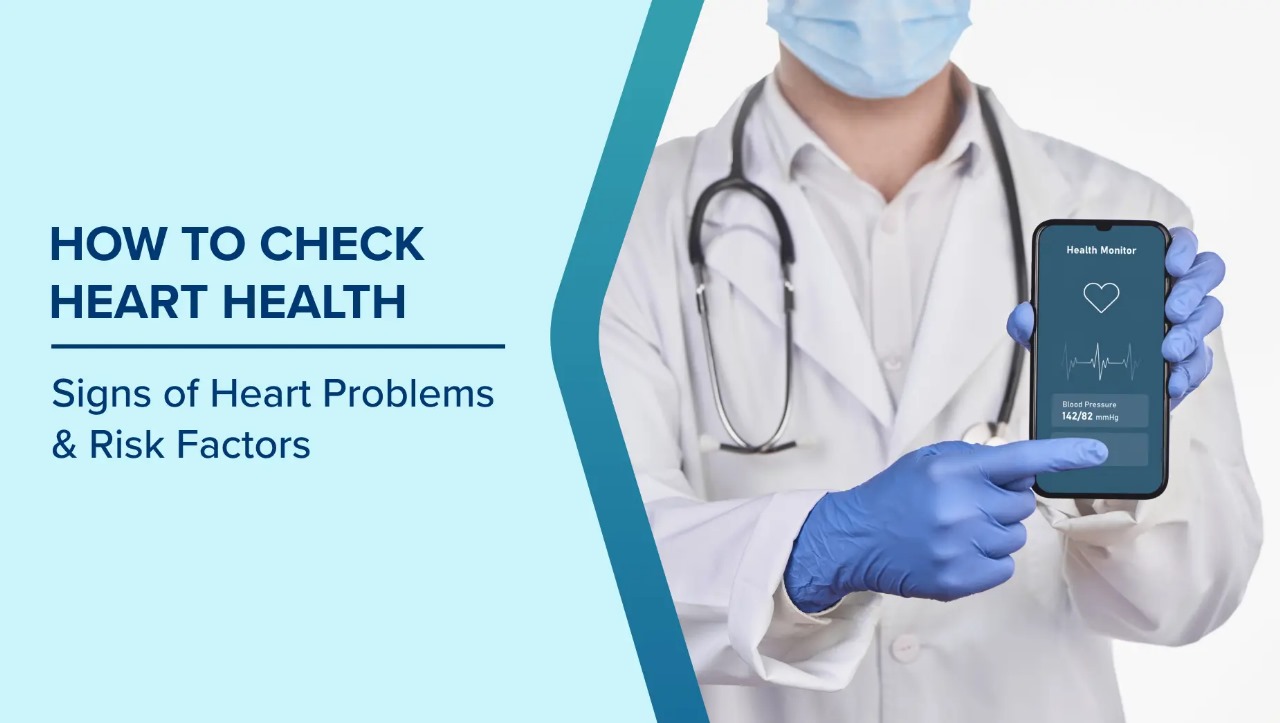Maintaining heart health is crucial for a long, healthy life. Heart disease often goes unnoticed until a serious event, like a heart attack, occurs. However, by staying alert to warning signs and understanding risk factors, you can catch potential issues early and seek timely treatment. Here’s a comprehensive guide on how to monitor your heart health, recognize the signs of heart problems, and understand key risk factors.
- Regular Health Screenings: The First Line of Defense
Routine screenings play a vital role in detecting early signs of heart disease. Key screenings include:
Blood Pressure Measurement: High blood pressure is a major risk factor for heart disease. Aim for a reading below 120/80 mm Hg.
Cholesterol Test: High cholesterol can lead to plaque buildup in the arteries, increasing heart disease risk. A lipid profile test helps measure total cholesterol, LDL (“bad” cholesterol), HDL (“good” cholesterol), and triglycerides.
Blood Sugar Levels: High blood sugar can damage blood vessels and the nerves that control the heart. Regular glucose monitoring, especially if you have diabetes, helps prevent complications.
Body Mass Index (BMI) and Waist Circumference: These measurements help assess obesity, a risk factor for heart disease.
Getting these tests at a trusted multispeciality hospital ensures accuracy and provides access to expert guidance on managing your results
Also Read: Non Invasive Cardiology Facility in Delhi NCR - Recognizing the Signs of Heart Problems
Heart issues often manifest through subtle symptoms that can easily be mistaken for other conditions. Be mindful of the following:
• Chest Discomfort or Pain: A classic symptom of heart problems, chest pain may feel like pressure, tightness, or burning. It might radiate to your shoulders, arms, neck, or jaw.
• Shortness of Breath: Feeling winded, especially after mild exertion or while lying down, could indicate heart failure or a problem with your heart’s valves.
• Palpitations: Irregular or rapid heartbeats can be a sign of atrial fibrillation or other heart conditions.
• Swelling in Legs, Ankles, or Feet: Fluid retention in the lower extremities may signal heart failure, especially if accompanied by weight gain or difficulty breathing.
• Extreme Fatigue: Persistent tiredness, even with adequate rest, can be a sign of heart disease.
• Dizziness or Fainting: These symptoms may indicate a drop in blood flow due to blocked arteries or an irregular heartbeat.
If you experience any of these symptoms, consult a doctor immediately for a thorough evaluation. - Understanding the Risk Factors for Heart Disease
While some risk factors for heart disease are beyond control, others can be managed or minimized with lifestyle changes. Key risk factors include:
• Age and Gender: Risk increases with age, and men generally face higher risks earlier in life compared to women. However, post-menopausal women also see a rise in risk.
• Family History: A family history of heart disease raises your likelihood of developing it.
• Smoking: Smoking damages the arteries and reduces oxygen levels in the blood, significantly increasing heart disease risk.
• Poor Diet: Diets high in processed foods, sugars, saturated fats, and salt can lead to high cholesterol, hypertension, and obesity.
• Physical Inactivity: A sedentary lifestyle contributes to obesity, high blood pressure, and poor cholesterol levels.
• Diabetes: High blood sugar levels can damage blood vessels, making diabetes a major heart disease risk factor.
• Excessive Alcohol Consumption: Regular heavy drinking increases blood pressure, weakens the heart, and contributes to obesity.
Identifying your risk factors allows you to make healthier lifestyle choices to lower your risk. - Heart-Healthy Lifestyle Changes
Prevention is key when it comes to heart health. Adopting these heart-healthy habits can make a big difference:
• Balanced Diet: Focus on whole foods, including fruits, vegetables, whole grains, lean proteins, and healthy fats like omega-3s.
• Regular Exercise: Aim for 150 minutes of moderate aerobic activity weekly, such as walking, jogging, or swimming.
• Quit Smoking: Quitting smoking has immediate and long-term heart benefits, reducing risk within a year.
• Limit Alcohol: Stick to moderate alcohol intake—up to one drink per day for women and two for men.
• Stress Management: Chronic stress can harm the heart. Practice relaxation techniques like meditation, yoga, or breathing exercises.
• Maintain a Healthy Weight: Reducing excess weight eases the strain on your heart. - When to Seek Medical Help
If you experience chest pain, difficulty breathing, palpitations, or fainting, seek medical attention immediately. Hospitals with specialized heart health departments offer diagnostic tests like electrocardiograms (ECGs), echocardiograms, stress tests, and more, ensuring timely diagnosis and treatment.
Regular check-ups, a balanced lifestyle, and staying alert to symptoms are essential for a healthy heart. Consulting a trusted healthcare provider can help you assess your risk and create a personalized heart health plan. Taking proactive steps now will empower you to protect your heart and enjoy a healthier life

